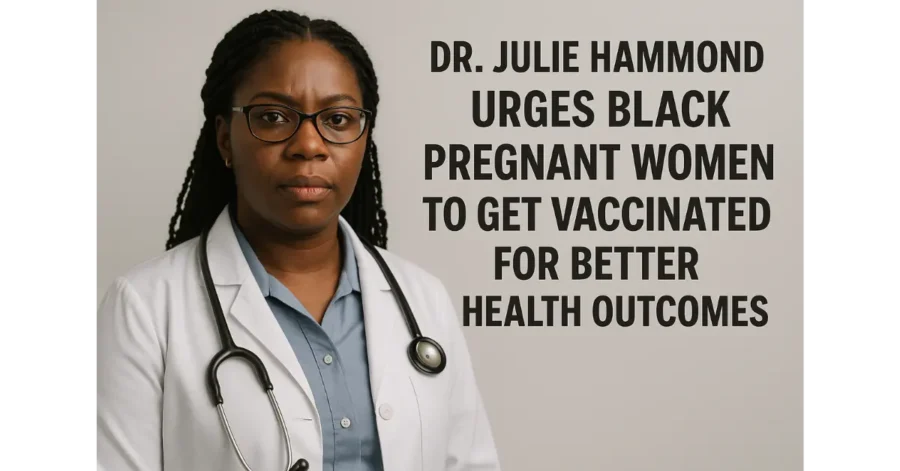
Dr Julie Hammond Urges Black Pregnant Women to Get Vaccinated for Better Health Outcomes
Dr Julie Hammond, an NHS GP and dedicated advocate for Black maternal health UK, has spoken candidly about the importance of maternal immunization—especially urging Black pregnant women vaccination. Her message is clear: vaccines during pregnancy are not only safe but critically important for protecting both mother and baby. If you’re expectant and seeking wise counsel, this article outlines what Dr Julie Hammond recommends, why it matters, and what this means for pregnancy health for Black women.
Who Is Dr Julie Hammond?
Dr Julie Hammond is a GP with eight years of clinical experience. She champions health equity and works across NHS England initiatives, including Core20PLUS and the Kent and Medway Local Maternity and Neonatal System Equity and Equality Oversight Group. Her commitment to narrowing disparities—especially in care for the Afro-Caribbean community—makes her advice particularly relevant for addressing maternal health disparities UK.
Why Vaccinations in Pregnancy Matter
Protecting Two Lives at Once
When a pregnant woman receives vaccinations, she isn’t just defending her own health—she’s also building a shield for her newborn. Through a natural transfer process, antibodies travel across the placenta and can safeguard infants from common early-life illnesses.
Recommended Vaccines
The NHS strongly advises expectant mothers to receive specific vaccines—especially those that provide maximum protection for infant health. Dr Hammond emphasizes four key vaccinations:
- RSV vaccination in pregnancy – Intended to shield babies from the potentially life-threatening Respiratory Syncytial Virus right after birth.
- Whooping cough vaccination pregnancy – Protects newborns in those fragile first weeks.
- Flu vaccination in pregnancy – The flu can be more severe in pregnant women and lead to complications for baby.
- COVID-19 vaccination for expectant mothers – Safeguards against serious infection in both mother and infant.
Together, these vaccines form a strong defense, reducing the risk of early hospitalization and infant mortality.
Spotlight on RSV Vaccination
A study in London, referenced by NHS England, found that the RSV vaccine for pregnant women could prevent approximately 900 baby hospital admissions annually. Reaching a 60% uptake could even avert nearly 40 neonatal ICU stays.
Dr Julie Hammond, who is currently receiving maternity care, plans to get the RSV jab herself. She hopes her example will encourage more to do the same:
“As a GP, I’ve seen babies who become so ill with RSV they end up in intensive care. This vaccine is the safest way to protect both mother and baby.”
— Dr Julie Hammond NHS England
With RSV being a top cause of winter pressures in pediatric care, the vaccine offers up to a 70% reduction in severe bronchiolitis in babies during their first six months—an outcome champions both for infant health and healthcare capacity.
Addressing Disparities for Black Mothers
Higher Risks, Lower Uptake
Black women in the UK face disproportionately higher rates of maternal morbidity and mortality. Yet, awareness and uptake of key vaccinations can be lower, often due to disparities in health communication and trust gaps.
Dr Hammond’s advocacy responds directly to this disparity. By sharing her experience and encouraging informed decisions, she aims to improve health outcomes and trust among Black pregnant women. Her visibility as a Black GP supporting maternal vaccination helps address barriers of trust and cultural relevance.
Community Health Impact
Building Trust Through Representation
When families see healthcare professionals who look like them—like Dr Hammond—public health messages resonate more. Her advocacy is a step toward increasing representation and encouraging open conversations about vaccination.
Supporting Family Health All Around
Dr Hammond also underscores that vaccines create safety nets not just for the baby, but for in-home family members—including the mother. With conditions like RSV and flu easily transmissible, vaccination is a protective measure for everyone under the same roof.
Practical Advice for Expectant Mothers
Dr Hammond offers practical guidance to empower those navigating pregnancy in today’s health landscape:
- Request vaccines at your 28-week appointment (especially RSV).
- Write a question list ahead of your visit—whether about safety, side effects, or schedule.
- Ask about combo visits—combining prenatal checkups with vaccine appointments can save time.
- Share experiences—some Black women may feel wary; open dialogue helps.
Dr Hammond emphasizes combining vigilance with practicality: vaccination is not optional—it’s a vital component of prenatal health.
Balanced Perspectives to Consider
- Perspective 1: Maternal Self-Advocacy
- Taking up vaccinations provides agency during pregnancy—especially for Black mothers navigating healthcare systems historically built without their needs in mind.
- Perspective 2: System-Level Barriers Remain
- While vaccination boosts protection, systemic changes—like improved outreach in underserved communities—must accompany individual health actions to achieve true equity.
Summary: Why This Matters
- Empowerment through Education: Dr Julie Hammond’s message gives expectant mothers knowledge and confidence.
- Immediate Health Benefits: Immunizations protect against serious infant illnesses like RSV, whooping cough, flu, and COVID-19.
- Systemic Change: Representation with Black maternal health advocates supports broader efforts to reduce gaps in maternal outcomes.
By proactively choosing vaccination, Black pregnant women improve their own safety and contribute to breaking cycles of health inequality. Every jab taken has ripple effects beyond the individual—it supports equity for future generations.
Conclusion
Dr Julie Hammond’s strong encouragement for Black pregnant women vaccination shines a spotlight on both personal and public health benefits. Whether it’s guarding newborns against potentially severe infections or tackling long-standing maternal disparities, vaccination during pregnancy is a critical step.
If you’re pregnant or supporting someone who is, these conversations—and conferring with trusted healthcare providers—can make a meaningful difference. When combined with wider systemic efforts for health equity for Black mothers, vaccination becomes part of a larger movement of empowerment, protection, and equality.
Let’s support mothers, celebrate advocates like Dr Hammond, and work toward a future where every child and parent benefits from fair access to care.
Let me know if you’d like a follow-up piece on how healthcare professionals can better communicate with diverse communities about maternal vaccination.

